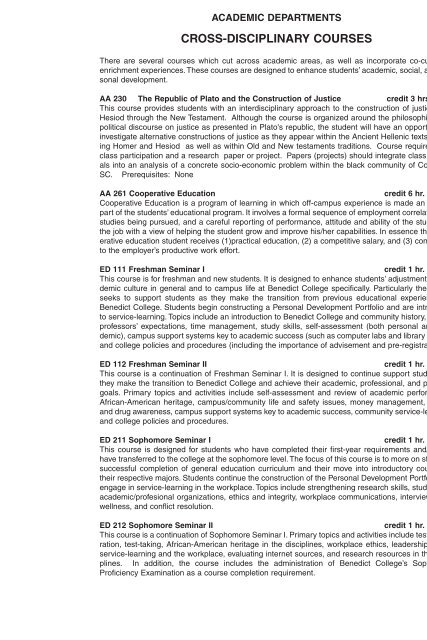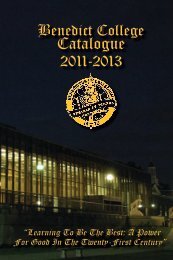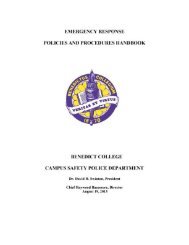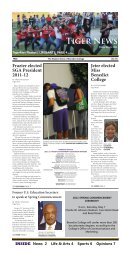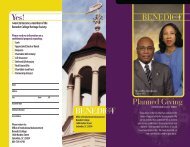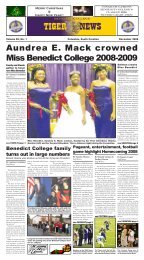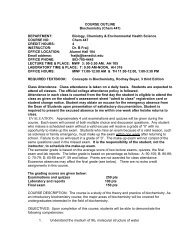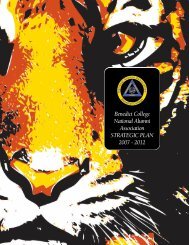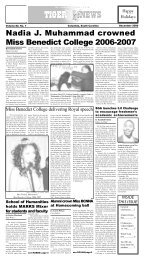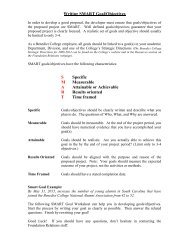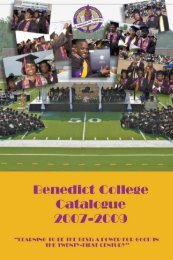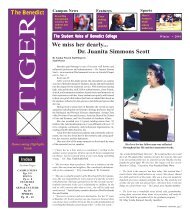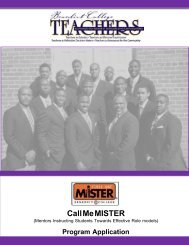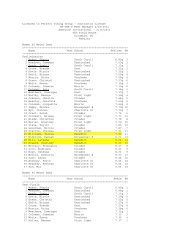2009-2011 - Benedict College
2009-2011 - Benedict College
2009-2011 - Benedict College
You also want an ePaper? Increase the reach of your titles
YUMPU automatically turns print PDFs into web optimized ePapers that Google loves.
ACADEMIC POLICIES 69<br />
ACADEMIC DEPARTMENTS<br />
CROSS-DISCIPLINARY COURSES<br />
There are several courses which cut across academic areas, as well as incorporate co-curricular<br />
enrichment experiences. These courses are designed to enhance students’ academic, social, and personal<br />
development.<br />
AA 230 The Republic of Plato and the Construction of Justice credit 3 hrs.<br />
This course provides students with an interdisciplinary approach to the construction of justice from<br />
Hesiod through the New Testament. Although the course is organized around the philosophical and<br />
political discourse on justice as presented in Plato's republic, the student will have an opportunity to<br />
investigate alternative constructions of justice as they appear within the Ancient Hellenic texts including<br />
Homer and Hesiod as well as within Old and New testaments traditions. Course requirements:<br />
class participation and a research paper or project. Papers (projects) should integrate class materials<br />
into an analysis of a concrete socio-economic problem within the black community of Columbia,<br />
SC. Prerequisites: None<br />
AA 261 Cooperative Education<br />
credit 6 hr.<br />
Cooperative Education is a program of learning in which off-campus experience is made an integral<br />
part of the students’ educational program. It involves a formal sequence of employment correlated with<br />
studies being pursued, and a careful reporting of performance, attitude and ability of the student on<br />
the job with a view of helping the student grow and improve his/her capabilities. In essence the cooperative<br />
education student receives (1)practical education, (2) a competitive salary, and (3) contributes<br />
to the employer’s productive work effort.<br />
ED 111 Freshman Seminar I<br />
credit 1 hr.<br />
This course is for freshman and new students. It is designed to enhance students’ adjustment to academic<br />
culture in general and to campus life at <strong>Benedict</strong> <strong>College</strong> specifically. Particularly the course<br />
seeks to support students as they make the transition from previous educational experiences to<br />
<strong>Benedict</strong> <strong>College</strong>. Students begin constructing a Personal Development Portfolio and are introduced<br />
to service-learning. Topics include an introduction to <strong>Benedict</strong> <strong>College</strong> and community history, college<br />
professors’ expectations, time management, study skills, self-assessment (both personal and academic),<br />
campus support systems key to academic success (such as computer labs and library usage),<br />
and college policies and procedures (including the importance of advisement and pre-registration).<br />
ED 112 Freshman Seminar II<br />
credit 1 hr.<br />
This course is a continuation of Freshman Seminar I. It is designed to continue support students as<br />
they make the transition to <strong>Benedict</strong> <strong>College</strong> and achieve their academic, professional, and personal<br />
goals. Primary topics and activities include self-assessment and review of academic performance,<br />
African-American heritage, campus/community life and safety issues, money management, alcohol<br />
and drug awareness, campus support systems key to academic success, community service-learning,<br />
and college policies and procedures.<br />
ED 211 Sophomore Seminar I<br />
credit 1 hr.<br />
This course is designed for students who have completed their first-year requirements and/or who<br />
have transferred to the college at the sophomore level. The focus of this course is to more on students’<br />
successful completion of general education curriculum and their move into introductory courses in<br />
their respective majors. Students continue the construction of the Personal Development Portfolio and<br />
engage in service-learning in the workplace. Topics include strengthening research skills, student and<br />
academic/profesional organizations, ethics and integrity, workplace communications, interview skills,<br />
wellness, and conflict resolution.<br />
ED 212 Sophomore Seminar II<br />
credit 1 hr.<br />
This course is a continuation of Sophomore Seminar I. Primary topics and activities include test preparation,<br />
test-taking, African-American heritage in the disciplines, workplace ethics, leadership styles,<br />
service-learning and the workplace, evaluating internet sources, and research resources in the disciplines.<br />
In addition, the course includes the administration of <strong>Benedict</strong> <strong>College</strong>’s Sophomore<br />
Proficiency Examination as a course completion requirement.


